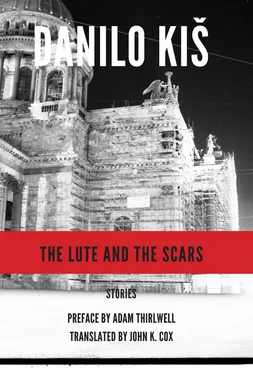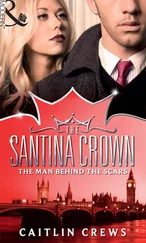To Maja Nižetić and Jerko Čulić, to whom I became indebted for gifts, words, and favors during my prison term: four crowns.
To the unfortunate Vladimir Čerini, who gave me a thousand dinars when I needed it the most, and who gave it “anonymously,” so to speak, so that the recipient, who was in trouble, did not perceive it as charity or a humiliation: two crowns.
To the unknown guard at the prison in Maribor, who pushed a scrap of paper and a tiny pencil under my door when writing meant survival for me: two crowns.
To the judge from Split, Jerko Moskovito, who assisted me in regaining my freedom at my trial, and who thereby demonstrated the degree to which one’s personal attitude and courage in hard times are capable of changing that fate which cowards believe to be inevitable and pronounce to be fate or historical necessity: two crowns.
To Fr. Alojzije Perčinlić, who revealed to me the strict, penurious, and industrious life of Franciscan monks; had I not become a “poet,” I would have become a priest: two crowns.
To Stipica Lukić, a Franciscan novice, who brought me bread, belief, and hope in the prison at Zenica: two crowns.
To the honorable sisters Hermina and Eparhija, who showed me by their example how one can subordinate the body to spiritual concerns, something that I tried to apply to my own life, within the limits of my own modest powers: four crowns.
To Count Ivo Vojnović, my benefactor and Maecenas, who saw in me that which I myself had hoped to possess: talent, that divinely bestowed blessing and curse: two crowns.
To Mr. Dinko Lukšić from Sutivan, whose hospitality made my days more pleasant and improved my health so that I could complete my volume of poetry: two crowns.
To the young investigating magistrate, a Viennese, who, on the occasion of my arrest in Split, allowed me to send for my personal effects, which had remained behind in my pension; he brought me Kierkegaard’s Either/Or , and that book would end up having a decisive impact on my intellect: two crowns.
To the sentry who allowed me to retrieve this book from the prison warehouse, where they kept the items they confiscated from us: two crowns.
To Jaromir Studnjički, the bookseller and bibliophile from Sarajevo, who exposed me to the “cosmic light” of books: two crowns.
To Gospava Dunđerović, who knew how to tell stories from the Ottoman times in the way the bards with their guslas once did— drawn out, lovely, precise : two crowns.
To Luj Bakotić, who made it possible for me not to squander my time in Rome on office work and for me not to be weighed down by obligations, so that instead I was able to learn, observe, and write: two crowns.
(“At the end, at the real final end, everything is good and everything is resolved harmoniously.” That’s Ivo Andrić. From Days of the Consuls .)
To Vladislav Budisavljević, whose understanding made it possible for me to devote myself to writing and to the study of history: in my work, these two things are mingled and interlaced, so that one can’t tell where the one begins and the other ceases: two crowns.
To Mrs. Vera Stojić, who took care of my manuscripts and correspondence, doing so out of love and respect: two crowns.
To Midhad Šamić, who discovered my sources and interpreted them in terms of erudition and creative impotence: one crown.
To that professor who gave me a copy of his book of aphorisms for my birthday: a crown (although actually he should give me a crown for having read it). As the old adage goes, a loan oft loses both itself and friend.
To Nurse Olga, who takes care of me, and who puts fresh flowers in my vase every morning and turns me over in my bed with a light but careful touch.
And on he went counting like that, to himself, in the quiet of the room filled with artificial light like the evening sun. At first his thoughts followed a chronology, but with the mounting pain (there wasn’t anything specific that ached; rather, everything caused him pain, and life itself hurt) the order became jumbled, the events grew confused, and time lost its way; only now and again did a coherent thought surface, as when the sun plays hide and seek behind the clouds.
He attempted, using his rosary of insulin drops, a rosary like those made of pearls, to tot up all the many sums he had enumerated so that he could establish the total amount he owed. He would begin and then stop again, then start counting once more with a vague dread, a dread akin to a shudder, that his woeful stipend — of two hundred crowns — would not be enough. He would have to leave somebody out for now; leave them empty-handed; he would have to remain indebted to someone. But whom should he cross off the list, especially when this list comprised only a part of his debts? He tried to reduce the total, to distribute it differently, but at any rate it wasn’t a sum of money that was at issue. Rather it was a sign of consideration, the result of his wish not to remain indebted to anyone in this world, at least insofar as one can settle accounts uniformly with one’s relatives, creditors, benefactors, and nuisances.
The nurse was sitting in the adjacent room, and through the open door she kept an eye on the monitor where the functions of the patient’s heart were being charted in jagged but evenly spaced waves. In her starched white smock, and with a white ribbon in her hair, she sat sideways at a table, reading a romance novel in Bazaar magazine: she was riding along on the wide blacktop; next to her sat Nick Chester with his shirt unbuttoned to reveal his powerful, hairy chest. “Nick had laid his right hand on her taut thigh; the car glided noiselessly along the broad asphalt road in the direction of Colorado. But suddenly, when he turned his head toward her to say those words she had waited so long to hear. ” The nurse braced herself by pressing her orthopedic sandals against the wall with all her might, as if to prevent the catastrophe that was taking shape in the next line of the text, in the form of a huge eighteen-wheeler; the truck appeared out of a curve and its headlights blinded Nick Chester, who never even got around to uttering the words that his young heart was dictating to him. Glancing up from the pages of Bazaar , where love was being extinguished before her eyes, the nurse directed her sleepy, mournful gaze at the monitor: the waves were growing ever more jagged and a glowing dot, accompanied by a light beep, was skipping across the white horizontal line. It was like the screen of a ping-pong video game (which she had seen two years before in a hotel down in Budva).
Then her eyes fell upon the sick man, and it seemed to her that he was moving his lips. Knowing that this was an important patient, she abandoned her spot on the seat of the Cadillac for a moment, there to the right of Nick Chester, and went over to the bed.
The patient looked her straight in the eyes.
“Do you need anything?”
“Lend me two crowns.”
His words were quiet, labored, but perfectly intelligible.
“Excuse me,” the nurse said, leaning over closer to him. “I didn’t quite get that.”
“I am two crowns shy of being able to settle my debts. I won’t stay indebted to you either, Nurse. I don’t want to remain indebted to anyone. I’ll pay it all back to you, too, right down to the last kreuzer .”
“Of course. I know you’re good for it. I’ll bring you the money right away.”
At that point she went over to the adjoining room.
“Doctor, the patient in No. 5 is asking me to lend him two crowns.”
“Give them to him, Nurse.”
“But two crowns , sir?”
“His mind is wandering, Nurse. Give him two dinars . If his condition worsens, call me. As long as he’s quiet, I don’t want to go in. That might upset him. Go. Do you have the two dinars ?”
Читать дальше












